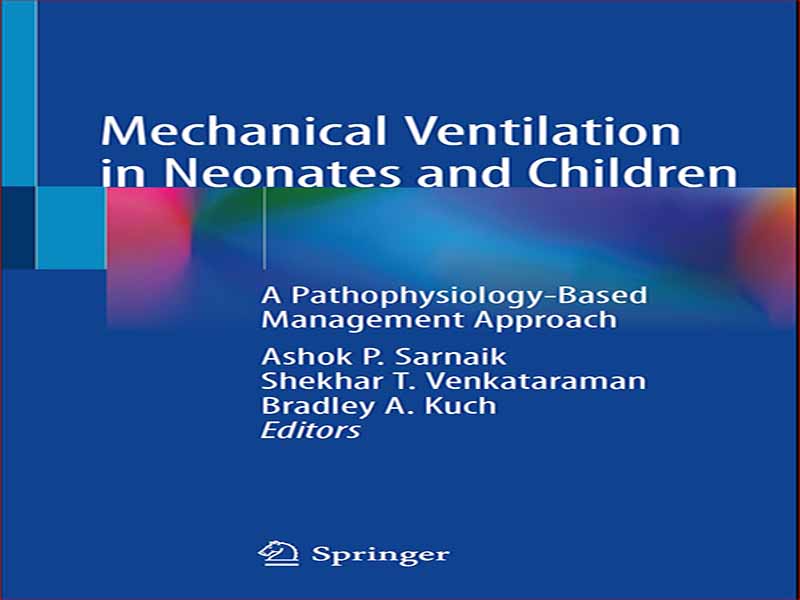- عنوان: Mechanical Ventilation in Neonates and Children
- نویسنده: Ashok P. Sarnaik
- حوزه: پزشکی اطفال
- سال انتشار: 2022
- تعداد صفحه: 266
- زبان اصلی: انگلیسی
- نوع فایل: pdf
- حجم فایل: 6.50 مگابایت
با وجود تعداد زیادی کتاب در این زمینه، ممکن است یک سوال منطقی این باشد که “چرا کتاب دیگری”؟ در طول دوران کاری خود به عنوان پزشک، محقق و مربی، مشاهده کردهایم که ارائهدهندگان مراقبتهای بهداشتی اغلب توسط ونتیلاتورها مرعوب میشوند، زیرا آنها بر روی دستگاه تمرکز میکنند تا پاتوفیزیولوژی تغییر یافته که باید به کمترین آسیبرسانی پرداخته شود و در عین حال زمان کافی برای بهبودی در نظر گرفته شود. رخ دادن. سازندگان ونتیلاتور با معرفی اصطلاحات مختلف برای مداخلات مشابه که سردرگمی بیشتری را ایجاد میکند، کار را آسانتر نمیکنند. ما همچنین مشاهده کردهایم که پرستاران، پزشکان و درمانگران تنفسی حوزههای توجه خاص خود را دارند. ما سعی کردهایم یک چارچوب مشترک بر اساس مکانیک ریوی وابسته به رشد و مکانیسم پاتوفیزیولوژیک زمینهای ارائه کنیم که همه اشکال حمایت از سیستم تنفسی را ضروری میکند. ما امیدواریم که این چارچوب ابزار موثری برای درک اختلالات پاتوفیزیولوژیک اساسی و منطق درمانی پشت اقدامات حمایتی لازم باشد. ما همچنین امیدواریم که این کتاب برای خوانندگان رشته های مختلف در سطوح مختلف تجربه، در کنار تخت به عنوان پزشک، در کلاس های درس به عنوان مربی و در محیط های دانشگاهی که فعالیت های علمی را انجام می دهند مفید باشد. ما با اصول سنتی و قدیمی مکانیک ریوی و فیزیولوژی تبادل گاز که توسط جولیوس کومرو آموزش داده شده و توسط جان وست ساده شده شروع می کنیم. اینها برای هر دانش آموزی مهم است تا درک خود را از اصول اختلال عملکرد ریه ایجاد کند. مفاهیم فرآیندهای ایستا و پویا توضیح داده شده و مکانیسم های جریان هوا در سلامت و بیماری توضیح داده شده است. اهميت معاينه باليني و ارزيابي فيزيكي به دنبال توصيف تكنيك هاي پايش مورد تاكيد قرار مي گيرد. در این چارچوب، ما هم پشتیبانی تهاجمی و هم غیرتهاجمی از تنفس را ارائه میکنیم. هر تلاشی انجام میشود تا نه تنها به خواننده هدایت شود که چه کاری انجام دهد، بلکه دلیل اینکه چرا یک رویکرد خاص در برخی موقعیتها برتر است اما در موقعیتهای دیگر نه، منطقی است. بخش جداگانه ای در مورد چالش های ویژه ای که در دوره نوزادی با آن مواجه می شوند ارائه شده است. در نهایت، ما رویکردهای مختلف مبتنی بر مورد را در مدیریت نارسایی تنفسی توصیف میکنیم.
With so many books on the subject, a reasonable question may be “why another book”? During our careers as clinicians, investigators and educators, we have observed that the healthcare providers are often intimidated by the ventilators as they focus on the machine rather than the altered pathophysiology that is to be addressed in the least injurious fashion while allowing sufficient time for recovery to occur. The ventilator manufacturers do not make it easier by introducing different terminology for similar interventions adding further confusion. We have also observed that nurses, physicians and respiratory therapists have their own areas of attention. We have attempted to provide a common framework based on growth-dependent pulmonary mechanics and underlying pathophysiologic mechanism necessitating all forms of support of the respiratory system. We hope that this framework is an effective tool to understand the underlying pathophysiologic derangements and the therapeutic rationale behind the supportive measures necessary. We also hope that this book will be useful for readers from different disciplines at varying levels of experience, at the bedside as clinicians, in the classrooms as educators and in the academic settings conducting scholarly activities. We begin with traditional, age-old principles of pulmonary mechanics and physiology of gas exchange taught by Julius Comroe and simplified by John West. These are important for any student to build his/her understanding the fundamentals of lung dysfunction. The concepts of static and dynamic processes are explained and mechanisms of airflow in health and disease are described. Importance of clinical examination and physical assessment is emphasized followed by description of monitoring techniques. Within this framework, we present both invasive and non-invasive support of respiration. Every attempt is made to not only direct the reader what to do but also the rationale for why a certain approach is superior in some situations but not others. A separate section on special challenges encountered in the neonatal period is presented. Finally, we describe various case-based approaches in managing respiratory failure.
این کتاب را میتوانید بصورت رایگان از لینک زیر دانلود نمایید.





































نظرات کاربران